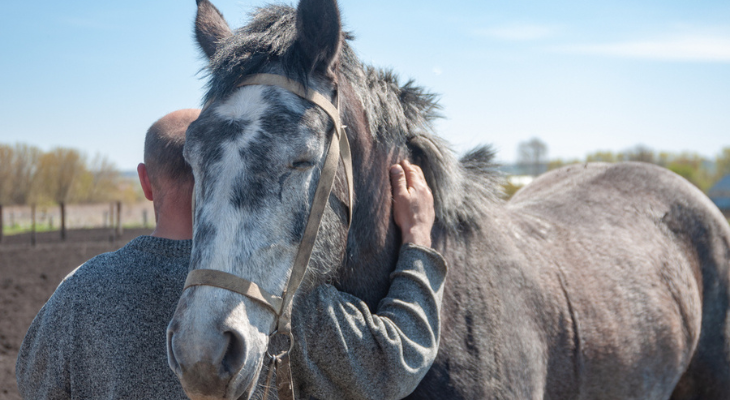
The Importance of Wellness Exams for Senior Horses
Health problems become more frequent as your horse ages. Scheduling regular wellness exams helps you ensure that illnesses, diseases, and injuries are diagnosed and treated promptly.
What Happens During a Wellness Exam
Wellness exams start with a physical examination. Your equine veterinarian looks at every inch of your horse from head to tail. He or she will:
- Take Your Horse's Temperature
- Examine Eyes, Ears, Teeth, Gums, and Hooves
- Listen to Heart, Lungs, and Gut and Check Vital Signs
- Check Your Horse's Body for Signs of Injuries and Illnesses
- Evaluate Your Horse's Coat and Look for Mange, Lice, Ticks, and Other External Parasites
Exams also include a check of the digital pulses in your horse's legs. Very strong pulses could be signs of inflammation, laminitis, or other conditions that require immediate treatment.
The body condition score is an important part of your horse's wellness exam. The score is an average derived by combining individual scores for the withers, tail head, neck, back, shoulders, and ribs and dividing by six. A 5.5 - 6.5 score is ideal for older horses, according to the Michigan State University Extension, although some experts advise a slightly lower score. The body condition scale ranges from 1 (emaciated) to 9 (extremely overweight).
If needed, vaccines will be given to protect your pet from common diseases, including rabies, tetanus, West Nile virus, and eastern and western equine encephalitis. Exams may also include bloodwork to check for illnesses, diseases, and organ and immune system function.
Common Health Problems in Senior Horses
Horses, like all animals, usually do a good job of hiding health issues until they're fairly serious. Unfortunately, health conditions can become serious quickly in older horses. Minor problems are less likely to turn into major health issues if your older horses see the equine veterinarian once or twice a year for wellness exams.
During wellness visits, your equine veterinarian looks for signs of illnesses, conditions, and diseases that commonly occur in older horses, including:
- Endocrine Disorders. Older horses are more likely to develop several endocrine disorders, including equine metabolic syndrome and pituitary pars intermedia dysfunction, according to The Horse. Endocrine disorders can cause several appearance changes, including a pot belly, excessive hair growth, and muscle wasting.
- Laminitis. Inflammation is the cause of laminitis, a condition that affects the tissues that attach the hoof wall to the coffin bone. Although many horses with laminitis experience severe pain, older horses may seem to be fine despite suffering from the condition. According to a research study conducted by the Swiss Institute of Equine Medicine at the University of Bern, horses over 25 can develop chronic laminitis without any outward signs or symptoms.
- Worn Teeth. Time takes a toll on teeth, causing them to wear down. If your horse has been losing weight or seems disinterested in eating tooth wear or missing teeth could be the reason. Your equine veterinarian can recommend feed choices that are easy to eat and help your horse stay healthy.
- Arthritis. Arthritis damages the rubbery cartilage that cushions the bones in your horse's joints. Damage to the joints causes pain and inflammation that may make it hard to stand, walk, or run normally. Pain medication, corticosteroid injections and special shoes can keep your horse comfortable.
Is it time for your horse's wellness exam? Contact our office to schedule an appointment with the equine veterinarian.
Sources:
Michigan State University Extension: Determining the Optimum Body Condition Score for Your Horse, 2/19/2013
https://www.canr.msu.edu/news/determining_the_optimum_body_condition_score_for_your_horse
Europe PMC: Age Over 25 Years, But Not Plasma Adrenocorticotropic Hormone Concentration Above the Seasonally Adjusted Reference Range Is Predictive for Radiographically Assessed Changes of Chronic Laminitis in Elderly Horses, 12/1/2020
https://europepmc.org/article/med/33263545
The Horse: Equine Wellness Exams 101, 3/2/2021
https://thehorse.com/185613/equine-wellness-exams-101/
Equus: Why Your Horse Needs A Fall Wellness Exam, 10/13/2022
https://equusmagazine.com/horse-care/fall-wellness-exam/
Stable Management: Dental Issues in Older Horses, 7/10/2023
https://stablemanagement.com/articles/equine-health/dental-issues-in-older-horses/
American Association of Equine Practitioners: Helping Your Horse Through Its Golden Years, 2016
https://aaep.org/horsehealth/helping-your-horse-through-its-golden-years

